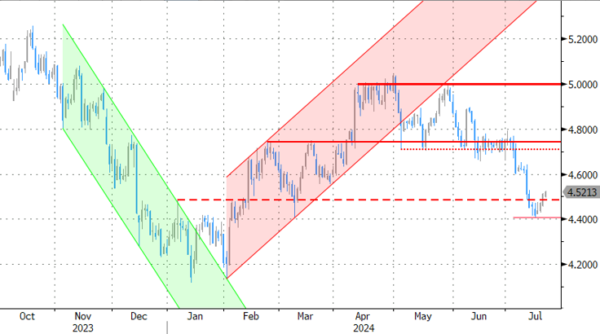Markets
Biden’s dropout from the presidential race grabbed most of the headlines today, if only because there was basically no other news to report. He and many other Democrats have endorsed the current runner-up Kamala Harris as the new nominee. What that means for the eventual election outcome and policy is unclear at this stage. Markets behaved accordingly. We’ve seen no such thing as an aggressive repositioning whatsoever. Equity markets showed some of the sharpest moves today following the biggest weekly loss in several month’s time. Technical support areas around 4820-4840 for the EuroStoxx50 (38.2% retracement on the 2024 rally, lower bound of a downward trading range) and 5500 for the S&P 500 (23.6% on the mid-April rally, June interim high) helped as well by living up to the name. Core bond yields looked for and eventually found a bottom end of last week. The front end of the curve both in Europe and the US today extends losses slightly, with Bunds underperforming Treasuries (+3 bps in the 2-yr vs +0.8 bps). Two of the big three on currency markets barely budge, resulting in extremely stoic EUR/USD trading in the high 1.08 zone. The Japanese yen performs best though it did forfeit some of the early gains this (European) morning. USD/JPY trades around 156.8, at least temporarily giving Japanese FX officials some relief. EUR/JPY tested the 170 barrier but no break occurred. Sterling snapped last week’s losing streak, inching marginally higher both against the dollar and the euro. After last week’s British economic update, Wednesday’s July PMI’s are the only release worth mentioning ahead of the Bank of England policy meeting August 1. Policymakers, not least governor Bailey, have been extremely quiet of late, even as the UK elections no longer force them to be. Without clear hints from officials and with the mixed eco update (the inflation/labour market/retail sales numbers respectively topped/matched/missed expectations), markets are almost perfectly 50-50 split on the inaugural rate cut in August. After Wednesday, which has PMI’s in store not only for the UK but also Europe and the US, attention turns to the first Q2 GDP growth estimate for the US on Thursday as well as the June PCE-deflators for the country on Friday.
News & Views
Poland’s June retail sales reported today printed on the softer side of expectations. Real sales (constant prices) rose 0.3 % M/M and 4.4% Y/Y, coming on the back of two months of negative growth in May and April. Positive growth in motor vehicles and parts (3.4%) and fuels (+1.5%) was partially counterbalanced by a monthly decline in most other subcategories. Real sales over the January-June period increased by 4.9% compared to the same period last year. The data suggest a modest recovery in domestic demand. The National bank of Poland (NBP) in its communiqué after the July 2-3 policy meeting still mentioned the risk of demand pressure in the domestic economy due to a marked wage growth. This assessment was confirmed by comments from MPC member Iwona Duda in an interview this weekend. In addition to demand and inflation risks of high wages, Duda indicated that the impact of higher energy prices (removing price caps) on households’ inflation expectations is another reason for the NBP to refrain from policy easing. She expects Polish inflation to be at heightened levels (about 6.0%) at the beginning of next year which only allows the NBP to start discussing interest rate cuts in the second half of next year.
The National Bank of Belgium’s (NBB) monthly consumer confidence indicator fell back in July after markedly improving last month. The NBB saw a worsening of all components of the indicator. Consumer expectations for the general economic situation in Belgium have dropped slightly (-16 from -15). In addition, fears of a rise in unemployment over the next twelve months have sharply intensified (19 from 12), following the clear abatement last month. On a personal level, households are less confident about their own future financial situation (-2 from 1), and less optimistic about their savings intentions over the coming twelve months (16 from 20).
Graphs
DXY: trade-weighted dollar draws no conclusions from Biden’s dropout

US 2-yr yield tries to build on end last week’s recovery, strenghtening the bottom at 4.4% as a solid one

Brent oil ($/b) slips below 200dMA, extending a drop since early July that wiped out almost half of the June gain

EuroStoxx50 kicks off this week with a nice gain after testing support at 4800+ last week










